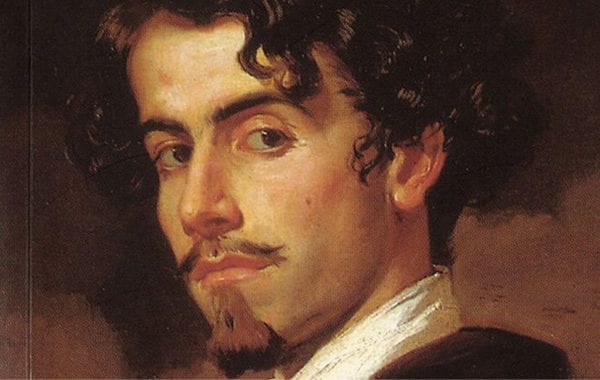Spain’s romantic poet: Gustavo Adolfo Bécquer
Spain’s romantic poet: Gustavo Adolfo Bécquer
Spain’s romantic poet: Gustavo Adolfo Bécquer
-
Hannah
-
Hannah


My romantic trilogy – comprising Indiscretion, Masquerade and the forthcoming Legacy – is set in Andalucía, Spain. As part of my research for the series, I travelled to this beautiful region and immersed myself in the culture and vistas. Then, when I returned home, I stacked my bedside table high with books on Andalucía and its people. My favourite by far was a collection of poems entitled Rimas y Leyendas by Gustavo Adolfo Bécquer.
Those who grow up in Spain know the name Gustavo Adolfo Bécquer well. He is widely considered to be on the key figures in the history of Spanish literature, and his Rimas y Leyendas(Rhymes and Legends) collection is required reading at most high schools. But outside of Spain he is, sadly, less well read. I say ‘sadly’, because his poetry is so sublimely lyrical and romantic, as you can see in the poem I share below.
First, a little about the man behind the words. He was born in 1836 in Seville. His birth name was Gustavo Adolfo Claudio Domínguez Bastida, but he took the name Bécquer in memory of his father, José Domínguez Bécquer, a respected and talented painter who died when Gustavo was five years old.
Tragically, Gustavo lost his mother at the age of eleven, and he subsequently went to live with his godmother. Doña Manuela Monahay had a large collection of books, and in her home Gustavo fell in love with literature, to the point that he would hole up day after day in the library and read. Doña Manuela saw Gustavo’s love for study, and that he had inherited his father’s talent as an artist, and she arranged for him to study at the studio ofa respected painter. A couple of years later Gustavo transferred to another artist’s studio, that of his uncle Joaquin. Joaquin quickly realised the boy was far more impassioned by the pen than the paintbrush, and he encouraged him to develop his writing.
Aged seventeen, Gustavo moved to the big city, Madrid, to become a poet. The reality was hard: he was unemployed and impoverished. For a short time, he took a job as a writer at a small newspaper, and in later years he worked for the government(before getting fired for writing and drawing on the job!). Ultimately, for most of his adult life he made writing his vocation – albeit one that initiallyearned him precious little income and notoriety.
Then came love. The love was unrequited, but the girl was to become his muse, even after Gustavo married Casta Esteban Navarro. He was unhappy in his marriage and disillusioned, despite having three children with the unfaithful Casta, and he dreamed of his first love.
Eventually, Gustavo earned a name for himself writing articles for newspapers, and he began in earnest working on two compilations of poems: Rimas (Rhymes)and Libro de losgorriones (Book of the Sparrows). I can only imagine his distress when the manuscripts were lost during the political revolution of 1868, having been given to President Luis González Bravo, who was exiled, but once the dust settled Gustavo began rewriting his works.
In 1870, Gustavo’s beloved brother Valeriano died. Gustavo was devastated, and lost without his lifetime companion. He died just three months later, most likely from tuberculosis. Before his death, Gustavo had requested that his friend Augusto Ferrán publish his poems posthumously, certain they would be more valuable then and would support his widow and children. He was right: Rimas y Leyendas is now a classic work of literature.
For a romantic like me, Gustavo’s poetry strikes a chord every time. His language is beautiful, his rhythm musical, his imagery vivid – and oh the emotion! He writes of the terrible ache of unrequited love; the consuming passion of new love; the quieter, stablising force of lasting love; and the wrenching angst of lost love.
Here is Rhyme 21, a very famous poem in Spain that so perfectly encapsulates love:
What is poetry? you ask, while fixing
your blue pupil on mine.
What is poetry! And you are asking me?
Poetry… is you.
And here is my favourite poem from the collection:
Eternal Love
The face of the sun may darken forever;
The oceans may run dry in an instant;
The axis spinning our planet may shatter;
Like a brittle crystal.
Yes, all of that may happen! At the end, Death
May cover my flesh with his funeral shroud;
But none of it will reach within my soul and extinguish
The bright flame of your love.
The English translation is beautiful, but I don’t think it quite touches the lyricism of the original. If you like poetry and romance, I highly recommend the dual language edition of Rimas y Leyendas, which allows you to read poems in both the native Spanish and English. It is available from Amazon at http://www.amazon.co.uk/Legends-selection-Leyendas-seleccion-Language/dp/048644788X.

Hi Hannah, Great post. Having grown up in Spain, I am a long time fan of Bécquer, and make it the protagonist of my book Immortal Love. If you are familiar with his legends, I think you´ll enjoy it! Always happy to meet a new fellow Bécquer fan!
I’ll be sure to check out your book! Thank you for commenting, Carmen.
Hi again, I just saw the cover of your novel Echos of Love. It has the same mask that the cover of Immortal Love. Uncanny.
Immortal
Love
(My Bécquer romance novel).